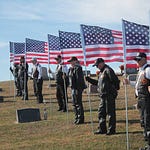
If I could go back and redo my 30 years of teaching, I would insist upon teaching 11th grade American Literature every year. As it was, though, my load for most of the years I taught was focused mostly on Spanish, so I didn’t get the opportunity to teach it until two years prior to leaving, but initially I didn’t look upon it as the special treat I’d soon to come view it as.
You see, the class — Advanced English 11 — was literally dumped on me two days before the school year began. The woman who was supposed to teach it had had a couple breakdowns at the end of the prior school year, and she’d told the administration that she wanted out of her contract for the next year because she didn’t think she could do it. They, however, opted to pooh-pooh her request, believing she’d be better after the two and a half months of summer break, but she wasn’t.
In fact, she simply didn’t show up for the work days that precede the start of classes. They sent police to check on her — she lived in a different town — and we at least ascertained that she was alive; however, she was quite adamant that she was NOT returning to teaching. Thus, I found myself in a meeting with administration and a few other teachers who were about to have our schedules changed to accommodate the mandatory English classes that had been assigned to her.
I took on the Advanced English 11 and English 8, and I regained Speech 9 — a class I’d long taught and had recently rid myself of so I could teach a creative writing class. Thus, I lost the electives that I loved teaching — creative writing, linguistics, and I had to push my advanced Spanish levels 3 and 4 into one class.
Anyhoo, I love American Literature, so having to teach that class wasn’t the problem. The problem was having it thrown into my lap two days before the class began. Essentially, from that moment on, for the rest of the school year, I stayed one step ahead of my students with reading the material and creating lesson plans, worksheets, quizzes, etc.
Fortunately, I had a pretty decent bunch of students that year, and they rose to the challenges I gave them with the literature. My focus was on improving their vocabularies by getting them to understand words as they were used in the stories, showing how literature was a reflection of our culture and that they things they were reading mirrored the things they were learning in their American History class, getting them to read and really think — not just answer comprehension questions, and challenging them with individual projects based on the readings.
Early in the textbook, there were two stories by Washington Irving. One was “Rip Van Winkle” and the other was “The Devil and Tom Walker.” I was really excited to read “Rip Van Winkle” with them until it became abundantly clear to me that not a one of them had ever heard of him
In fact, none of them claimed to have ever heard of Washington Irving either until I mentioned that he’d also written “The Legend of Sleepy Hollow.” Then, only a couple of them said they’d heard of the Headless Horsemen, but they only knew of him from the movie versions, and neither of them could tell me who Ichabod Crane was.
If you have any desire to read these stories, here are links to each: Rip Van Winkle, The Devil and Tom Walker, and The Legend of Sleepy Hollow
Washington Irving is a legend of American Literature, in my opinion, and he used legends from the Old World and adapted them to the New World, creating folktales that have withstood the test of time — mostly. I think it’s unfortunate that so many kids now have no idea who he is or who the characters that he created are.
My love of his writing was greatly enhanced when I read his “Tales of the Alhambra.” This was more meaningful to me since I also taught Spanish and because I’ve been to the Alhambra in Granada, Spain. Irving resided there for about four months in 1829, and he composed the stories about his stay in what was then a pretty rundown palace — it’s not rundown anymore, I assure you.

One of the things I most enjoyed doing was making my students find places mentioned in the stories we read on a map. They, in turn, would complain that this wasn’t geography class, but I just let them complain. Too often, young people (and many old ones) have no concept of where things are in the world and no idea of the historical relevance of some of those places.
Irving is buried in Sleepy Hollow cemetery in Sleepy Hollow, New York.
Irving used the Catskill Mountains in his stories as well as other places, such as Sleepy Hollow, that are found in the New England portion of our country — the birthplace of what is now a giant, sprawling beast of a country. Since we live far from that part of the country, many of my students had never been to the East Coast and may never visit there in their lifetimes, but they need to understand the significance of that part of the U.S.
American Literature is the best metaphor for our country because it’s a melting pot of everything we are — our history, our geography, our past leaders, our culture that sprang from a blending of cultures, our innovations, our revolts, our embarrassments, our people, our expansion, etc., etc., etc.
In fact, American Literature is far too grand of a concept to be relegated only to one year of high school English. It should be studied every single year of school, thus giving authors like Irving much more his due. An entire year could be spent on him alone, quite frankly, or better yet, his stories and impact could be sprinkled throughout the years.
That way, by the time a child reached his junior year of high school, the English teacher wouldn’t have to explain who Ichabod Crane was or wouldn’t have to be appalled that no one in her class had ever heard of Rip Van Winkle, the man who slept twenty years of his life away.
Perhaps, too, if they were better introduced to the people and places that make up our history and culture, fewer people would make fools of themselves trying to answer basic U.S. trivia-knowledge questions on the boardwalks of California and other places that show up on YouTube and the like and make Americans look like idiots. Frankly, I’m tired of it.
As I mentioned above, I enjoyed incorporating other subjects into my lessons because I see how all school subjects are interconnected. When I write my own novels, I like to include a strong sense of place in my stories. “The Clearwater House” makes those who read it think of Clearwater and rural Nebraska as well as Omaha a little bit. “Ticker Tape” embodies Vietnam.
In my newest novel, “Trouble on Tybee,” Tybee Island, Georgia, is basically a character in the book. The story wouldn’t exist without Tybee. Some people immediately know where Tybee is because they’ve been there, a few have heard of it but couldn’t tell you where it is, and others have never heard of it at all. For those, I would say — “Look it up.”
Understand where the places about which you are reading are located. Expand your horizons, if only in a literary fashion. If you are up for a trip there, though, I say “Go for it.” Tybee is beautiful and worth your time for a visit.
While I’ll never come close to Irving’s talent or to his far-reaching influence, I like to think that I’m adding a few humble contributions to the great, ever-changing entity that is American Literature.
And since we recently celebrated my favorite American tradition, Thanksgiving, I want to thank you again for being a reader, and I want to apologize for skipping last week. I needed a break.
Even though I only taught American Literature for two years, I’ve embraced it my whole life, and I don’t see it as something that a person is “taught” anyway. It’s something we live and breathe, and we should all be lifelong learners who teach ourselves from whatever pieces of American Literature we choose to read.
If you’ve never read Irving, or if it’s been a long time, pick up one of his stories and have a go of it — I have three links above if you missed them to the three stories I mentioned here. Keep a dictionary nearby or look up unknown words on your device, locate the geographical places he mentions, dive into the history of the people referenced, and maybe even watch one of the many video versions of his story that you can find online. Make the story come to life, and it will become a part of your makeup.
My copies of “Trouble on Tybee” will be arriving any day now — I ordered so many that it’s taken longer than normal to get them printed and off to me. Next time, I’ll read a portion of the book to my paying subscribers, so please become one if you aren’t already, so you can hear part of the story — or buy a copy for yourself if you’re so inclined.
Until next time.
Tammy Marshal
l














Share this post